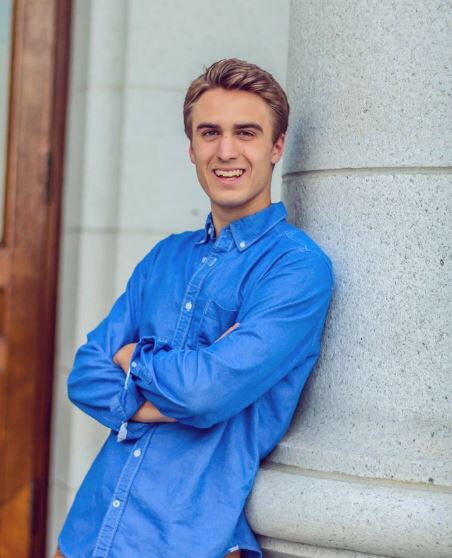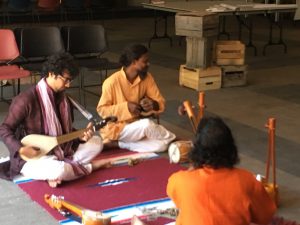
Sam Ropa is a UW-Madison senior with a double major in Geography and Anthropology. In the spring of 2018 he received a Kohn award from the Jerome Kohn Geography Fund, used to support undergraduate students who demonstrate a strong interest in geography as a major or career choice.
Sam used the Kohn Award to help finance internships this past summer at the American Anthropological Association and the Smithsonian Institution’s Center for Folklife and Cultural Heritage in Washington, D.C., where he worked on a cultural exchange program that hosts visual artists, musicians, and cultural heritage professionals from West Bengal, India. Read more about Sam’s internship experience, background in geography, and future career goals below!
How did you become interested in Geography?
I found Geography as a college freshman, a student realizing just how complicated social science really was. I was then pursuing an Economics degree, trying desperately to justify social reality in terms of economics’ rational foundations. How can wage gaps, income inequality, economic racism, ecological catastrophe, be in any way rational? During this struggle, I turned away from my Economics 101 course to International Studies: Global Poverty and Inequality—then taught by the geographer Professor Stephen Young—for answers. While I found very few answers, Geography gave me a language to ask challenging questions about complicated social problems. It showed me that economic relationships are meaningful and culturally informed, and are never unmediated by prevailing power relations. It taught me that discourse and representation, as well as material arrangements, were crucial to understanding society and economy.
Also drawing me into Geography were my longstanding interests in agriculture and food ethics. Professor Holly Gibbs’ course, which explored every facet of global agriculture, from policy-making to commodity markets to land-use and climate change, left me convinced that Geography could synthesize all of my interests under one major. Other courses in the department stoked my interest in the field by showing me that Geography was imminently critical. Professor Robert Kaiser’s course on Critical Geopolitics explained that geographic imaginaries organize our relations to time, space, nation-states and other communities. The humanism of the field means that geographers acknowledge social injustices—patriarchy, systemic racism, mass incarceration, gentrification, wealth inequality—that other scholars might overlook. This recognition and confrontation of social injustice (at all scales: local, national, global) was important to me, as a student and as an activist.

Tell us about what you did this summer.
This summer I worked as a national intern for the American Anthropological Association’s office in Arlington, VA, which partly sponsored my internship at the Smithsonian Institution’s Center for Folklife and Cultural Heritage, a research and educational unit which hosts the Smithsonian Folklife Festival, conducts ethnographic and cultural heritage policy oriented research, and produces exhibitions, documentary films, publications, and educational materials.
At the Center, I interned under Dr. Betty Belanus, the leading curator of a cultural exchange which hosted visual artists, musicians, and cultural heritage professionals from West Bengal, India. The exchange, called ‘Community Connecting Heritage: Learning Together for a Brighter Future’ is a partnership between the Smithsonian Center for Folklife and Cultural Heritage and Contact Base, an organization in West Bengal that promotes inclusive and sustainable development through cultural heritage and works to protect the rights of “women, children, and indigenous people.” For the first few weeks of the internship I worked closely with the Bengali artists and the curators, planning and staffing events related to the exchange, and creating promotional materials for smaller ‘pop-up’ exhibitions that the artists put on.
At the American Anthropological Association office, I investigated historic trends in National Science Foundation funding for anthropology-related research for the Association’s Manager of Education, Research and Professional Development. Throughout summer I reflected on my internships in the form of short blog posts, which relayed my experiences to the donors who helped make the internship possible.
In what ways did your background in Geography help you with this experience?
The UW Geography Department gave me professional experience that proved invaluable at the American Anthropological Association and at Folklife. During my second year, I worked in the History of Cartography Project, an editorial venture that publishes a series on the history of maps and map-making; as an office assistant at the Project, I worked with Beth Freundlich, the Project Manager, on project development, database management, and donor outreach, and with Jude Leimer, the Project Editor, to develop manuscript bibliographies, organize lists, and gather cited works. The skills I gained at the Project, in project-based research and office management, served me as I approached research for the American Anthropological Association and promotional tasks for the Smithsonian.
The experience was reflection of my academic background in Social Geography. My coursework gave me an appreciation for institutions that protect marginalized art forms, languages, and modes of expression. Institutions like this, that foster cultural pluralism—that recognize and promote the meaningful aspects of human life—strengthen democracy by challenging dominant culture, making society more representative.
What were the most important things you learned through this experience?

I was overjoyed to learn about the social and cultural work that organizations are doing outside the academy. Centers, museums, cultural heritage groups, and think tanks across the Smithsonian and the Washington, D.C. area showed me that education and research can be done in a variety of settings. I had always expected that pursuing a degree in Geography (or Anthropology, my other major) would inevitably lead me towards a faculty position in a college or university, although I knew not all doctorates took this route; it has been clarifying to work with scholars in a range of settings—whether they are folklorists, anthropologists, or geographers—who exemplify the role or scholarship outside the academy.
While the experience was enormously gratifying, my internships helped me realize that I want to use my background in geography to advocate for environmental justice. I plan to pursue a law degree and a career in public service, with a focus in public interest environmental litigation. This choice is an extension of my training as a geographer and what I saw as the commitments of the UW-Madison Geography Department; this is how I hope to exemplify scholarship outside the academy.



